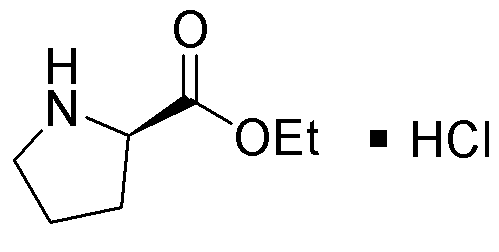D-Proline ethyl ester hydrochloride is widely utilized in research focused on:
- Pharmaceutical Development: This compound is often used as a building block in the synthesis of various pharmaceuticals, particularly in the development of drugs targeting neurological disorders due to its ability to cross the blood-brain barrier.
- Peptide Synthesis: It serves as an important intermediate in the synthesis of peptides and proteins, enhancing the stability and bioactivity of these compounds, which is crucial in drug formulation.
- Chiral Catalysis: D-Proline ethyl ester hydrochloride acts as a chiral catalyst in asymmetric synthesis, allowing chemists to produce enantiomerically pure compounds more efficiently, which is vital in the production of many drugs.
- Research in Biochemistry: It is utilized in studies related to protein folding and enzyme activity, helping researchers understand biochemical pathways and develop new therapeutic strategies.
- Cosmetic Applications: The compound is also explored in the cosmetic industry for its potential benefits in skin care formulations, providing moisturizing and anti-aging properties.
General Information
Properties
Safety and Regulations
Applications
D-Proline ethyl ester hydrochloride is widely utilized in research focused on:
- Pharmaceutical Development: This compound is often used as a building block in the synthesis of various pharmaceuticals, particularly in the development of drugs targeting neurological disorders due to its ability to cross the blood-brain barrier.
- Peptide Synthesis: It serves as an important intermediate in the synthesis of peptides and proteins, enhancing the stability and bioactivity of these compounds, which is crucial in drug formulation.
- Chiral Catalysis: D-Proline ethyl ester hydrochloride acts as a chiral catalyst in asymmetric synthesis, allowing chemists to produce enantiomerically pure compounds more efficiently, which is vital in the production of many drugs.
- Research in Biochemistry: It is utilized in studies related to protein folding and enzyme activity, helping researchers understand biochemical pathways and develop new therapeutic strategies.
- Cosmetic Applications: The compound is also explored in the cosmetic industry for its potential benefits in skin care formulations, providing moisturizing and anti-aging properties.
Documents
Safety Data Sheets (SDS)
The SDS provides comprehensive safety information on handling, storage, and disposal of the product.
Product Specification (PS)
The PS provides a comprehensive breakdown of the product’s properties, including chemical composition, physical state, purity, and storage requirements. It also details acceptable quality ranges and the product's intended applications.
Certificates of Analysis (COA)
Search for Certificates of Analysis (COA) by entering the products Lot Number. Lot and Batch Numbers can be found on a product’s label following the words ‘Lot’ or ‘Batch’.
Número de catálogo
Número de lote/lote
Certificates Of Origin (COO)
This COO confirms the country where the product was manufactured, and also details the materials and components used in it and whether it is derived from natural, synthetic, or other specific sources. This certificate may be required for customs, trade, and regulatory compliance.
Número de catálogo
Número de lote/lote
Safety Data Sheets (SDS)
The SDS provides comprehensive safety information on handling, storage, and disposal of the product.
DownloadProduct Specification (PS)
The PS provides a comprehensive breakdown of the product’s properties, including chemical composition, physical state, purity, and storage requirements. It also details acceptable quality ranges and the product's intended applications.
DownloadCertificates of Analysis (COA)
Search for Certificates of Analysis (COA) by entering the products Lot Number. Lot and Batch Numbers can be found on a product’s label following the words ‘Lot’ or ‘Batch’.
Número de catálogo
Número de lote/lote
Certificates Of Origin (COO)
This COO confirms the country where the product was manufactured, and also details the materials and components used in it and whether it is derived from natural, synthetic, or other specific sources. This certificate may be required for customs, trade, and regulatory compliance.


